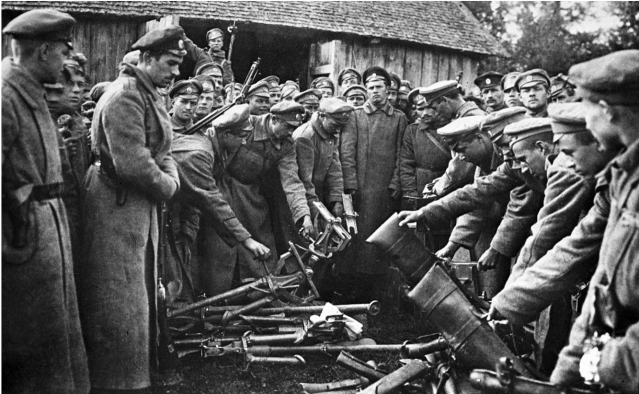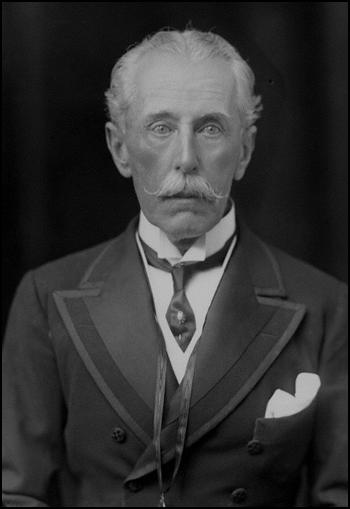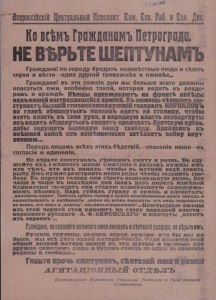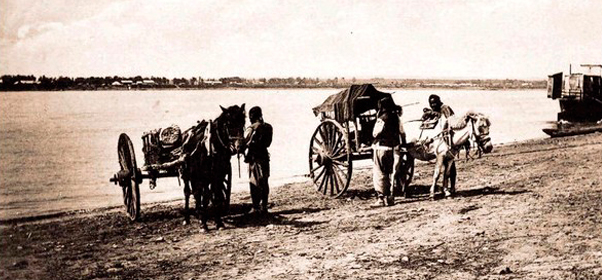
As the summer of 1917 turned to autumn, revolutionary Russia descended further into chaos. Kerensky’s June Offensive had ended in failure. The unrest of the July Days only underscored the rifts in Russia’s increasingly combative politics. In the cities, supplies of basic necessities such as food and fuel were as erratic as ever, and conflict between workers and employers continued to flare up. Peasants in the countryside carried on with land seizures, while the army was plagued by desertions and ill-discipline. Therefore, when General L.G. Kornilov declared that “our great motherland is dying“, his opinion was probably shared by many.
The exact circumstances of the Kornilov Affair are still unclear. Kerensky had appointed Kornilov Supreme Commander of the army in August, during the political shake-up that accompanied the July Days. A war hero, liberal sympathiser and staunch advocate of military discipline, Kornilov appeared to be the long-awaited “strong man”, a force for order and unity amidst the revolutionary maelstrom. But when the Germans continued their advance and the Kerensky government failed to bring the Soviet to heel, Kornilov responded with a mutinous march on Petrograd on 10 September 1917.
The whole affair lasted a mere three days. In Petrograd, Ambassador Liu kept up a running report on events, from the first rupture between Kerensky and Kornilov to the latter’s surrender and dismissal. Nevertheless, the sheer confusion surrounding the Kornilov affair warranted further discussion. Exactly who had instigated the mutiny? Was Kornilov attempting a wholesale coup, or was he Kerensky’s pawn in the latter’s attempt to crush the Soviets, as the bolsheviks claimed? Was it all a tragic miscommunication exacerbated by former Procurator of the Holy Synod V.N. Lvov, who took it upon himself to act as go-between for the two men, pretending to be empowered by Kerensky to offer Kornilov dictatorial powers? And just what was the role of Allied diplomats in encouraging Kornilov?
With Petrograd awash in rumour, Ambassador Liu attempted a detailed analysis of the Kornilovshchina immediately after it had ended. His lengthy report is worth quoting in part.
比來俄國帝制派,暗試飛躍,已非一日,臨時政府偵知其事,嚴為之備,先安置廢皇於托波爾斯克城,未幾皇弟皇叔亦各就其邸宅看管,同時並將宗社黨重要人物,如前西南路總司令上將顧爾谷等,押送出境,其防患未形,類多如此。帝制派知事機已泄,急圖一逞,利嘎失陷,人心震動,乃由素為哥薩克騎軍所傾向之高大元帥首先發動,特派代表勒伏甫(即前教務總長)往晤總理蓋能斯基 ,借辭軍務廢弛,政治腐敗,要求讓與全權,由彼獨裁,另組政府,並邀蓋前往面商,蓋怒,即由電話詢問高帥屬實,遂下令撤高,一面拘留勒伏甫,並將情形通告全國。高則宣布閣員為德派,立遣重兵由盧格進窺俄京,相距僅二百余裡。
Recently, the Russian pro-monarchy faction has been conspiring to act boldly. This is ongoing and the Provisional Government, detecting this, has strictly guarded against it, first by settling the deposed tsar in Tobolsk. Then, in quick succession, the tsar’s brother and uncle were also put under guard in their residences. At the same time important members of the imperial party, such as Commander of the Armies of the Southwestern Front General [A.E.] Gutor [?], were forcibly sent away. Such were the preventive measures. Knowing that they had lost the initiative, the monarchists desperately planned a move. When Riga fell and the popular mood was shaken, Supreme Commander Kornilov, whom the cossack [sic] cavalry was inclined towards, was the first to act, sending a representative Lvov (former Procurator of the Holy Synod) to meet with Prime Minister Kerensky. On the basis that military matters have become slack and politics corrupt, he demanded that full powers be given to him, with him as dictator, and to reorganise the government. Kerensky was also invited to go and meet with him. Kerensky was angered and immediately telephoned to find out the truth from Kornilov, then ordered that he be dismissed. Lvov was arrested and the situation was announced to the whole country. Kornilov then declared that the Cabinet were German agents, immediately dispatching a large force to infiltrate the capital from Luga, only some 200 miles away.
Letter from Liu Jingren, 9 October 1917 (sent 16 September). Zhong-e guanxi shiliao, Minguo jiunian zhi banian (1917-1919). E zhengbian yu yiban jiaoshe (1), p. 155.

Liu described the failure of the mutiny thus:
政府亟調兵抵制,並拆毀鐵路,以阻其前進。同時,俄京及莫斯科均宣布戒嚴,情形岌岌,勢幾不可終日。迨政府兵隊與高軍相遇,彼此以自殘為非計,各舉代表約定兩不相犯,如是者二日,是時高軍知為高氏所愚,咸懷怒懟,一致宣布效忠政府,蓋高帥舉兵趨俄京時,偽言俄京被亂黨佔據,臨時政府已推倒云云,及兩方代表晤談,始得發其覆而揭其隱也。
The government hurriedly sent troops to resist and tore up the railways to prevent [Kornilov’s forces] from advancing. At the same time, a curfew was announced in the capital and Moscow. The situation was critical and it seemed that there was no way out. But when the government’s and Kornilov’s troops met, both sides saw that fratricide was not an option. They each elected representatives who agreed that both sides should not attack each other. Thus, on the second day, when Kornilov’s troops realised that they had been fooled by him, they were all enraged and unanimously declared their loyalty to the government. After all, when Kornilov called the troops out to the capital, he had falsely claimed that the capital had been occupied by the bolsheviks and that the Provisional Government had already fallen. It was only when the representatives of both sides met and spoke that they blew his cover and unearthed his deceit.
Ibid., pp. 155-156.
Liu’s take on the Kornilov affair was not very penetrating: He maintained that Kornilov was part of a monarchist plot and made no mention of the role of radical socialists and railway workers in disrupting the mutiny. Neither was Lvov a straightforward “representative” of Kornilov’s.

Interestingly enough, however, he described an incident with the diplomatic corps that might have added to the popular sense of conspiracy:
本月十日下午,領袖英大使邀使團特別會議,謂俄外部面告,政府與高帥將以兵力從事,俄京危急,保護難周,請轉商使團,如願暫行他往,則芬蘭與莫斯科為適宜,可明晚備車與以利便,伊則不願他往。一、英僑須保護,二、他往同一艱危,三、政府在此,一切須接洽等因。使團聞言,均贊其說。並謂如兩方爭持不下,遇必要時,且可出任調停云,事遂決。
On the afternoon of the 10th, the British ambassador, leader of the diplomatic corps, invited the corps for a special meeting. He said that the Russian Foreign Ministry had informed him that the government and Kornilov would soon engage in armed conflict. The capital would be in danger and protection could not be assured. He asked [the ambassador] to convey to the corps that if they wished to go elsewhere temporarily, Finland or Moscow would be suitable and transport could be arranged tomorrow night for their convenience. But [the ambassador] would not leave. First, British migrants must be protected. Second, other places would be as dangerous. Third, the government was here and it would be necessary to negotiate with it. Hearing this, the corps all approved of his statement. And he said that if both sides would not back down, if necessary, they could act as mediators and the matter could be solved.
Ibid., p. 156.
It was then agreed to issue a statement officially to the Russian Foreign Ministry and unofficially to Kornilov via the Belgian military attache. In it, the Allied diplomatic corps offered its good offices in “mediation” between Kerensky and Kornilov and reiterated the need for Russia’s continued commitment to the war effort. Kornilov accepted the offer:
D’autre part le Général Korniloff auquel je viens de communiquer officieusement la note qui faisait l’objet de votre télégramme me charge de remercier en son nom les Représentants des Puissances Alliée et de leur dire qu’il accepte leurs bon offices.
Ibid., Appendix A, p. 3.

Unsurprisingly, rumours of Allied involvement soon reached the Russian press:
越日,俄京各報竟有登載外交團在英館會議一事者。大致謂,俄國近日情形,聯盟國各使曾與我外交總長開會詳議,若云聯盟國各使或有壓迫情事,則並毫未而無之,本館敢為大眾確實宣告,今日午時系第末次會議,預會者為英、法、義、美四國大使,會議時各大使發表友誼與臨時政府,並與外交總長關於近日情狀互換意見,各大使詞意極形誠摯,而以躬親之閱歷,忠告臨時政府,冀了結俄國之危險云云。俄外部閱報后,以所雲一切與事實不甚符合,深恐外間不明真相,或生誤會,遂請英、美、法、義四大使赴部商議。英使即請外部將函稿原文登載俄報,並冠以解釋之詞,外部極表同意,惟請將文中調停字樣刪去,以免民間視為聯合各國以臨時政府與高帥列於平等地位。
The next day, some of the newspapers in the Russian capital actually carried stories on the diplomatic corps’ meeting in the British embassy. In essence, they said, “The Allied ambassadors have previously met with our [Russian] Foreign Minister to discuss the recent events in Russia in detail. It is said that the Allied ambassadors may be suppressed, but there is no such thing. This newspaper ventures to announce accurately to the public that the last meeting took place this afternoon, in attendance were the four ambassadors of Britain, France, Italy and America. At the meeting, each ambassador expressed friendship towards the Provisional Government and exchanged views with the Foreign Minister regarding the recent situation. Each ambassador spoke with deep sincerity and, speaking from personal experience, advised the Provisional Government that they hoped for a resolution to the danger in Russia.”
After the Russian Foreign Minister read the newspapers, since their accounts did not accord with the actual circumstances, he was deeply worried that outsiders would not know the truth and might come to a misunderstanding. He then called the British, American, French and Italian ambassadors to the Ministry to discuss this. The British ambassador requested the Foreign Minister to publish the original text of the letter in the Russian newspapers, headed by an explanatory note. The Minister strongly agreed, but asked that the word “mediation” be removed from the text, to avoid the people thinking that the Allies gave equal status to the Provisional Government and to Kornilov.
Ibid., pp. 156-157.
According to the American ambassador, however, it was not just the word “mediation” that Foreign Minister M.I. Tereshchenko found objectionable, it was the entire notion of Allied good offices. Given that British military attache Alfred Knox supported Kornilov’s coup – a fact exploited by none other than Trotsky – it is perhaps understandable that the Provisional Government would be wary of further Allied involvement, especially due to their firm stance on the war and the “misunderstandings” this could generate among the Russian public. Yet one wonders why Liu did not mention Tereshchenko’s refusal of Allied help, or why the offer of “good offices” was kept in the subsequent press release – minor mysteries, perhaps, in the ongoing controversy over the Kornilov affair.
